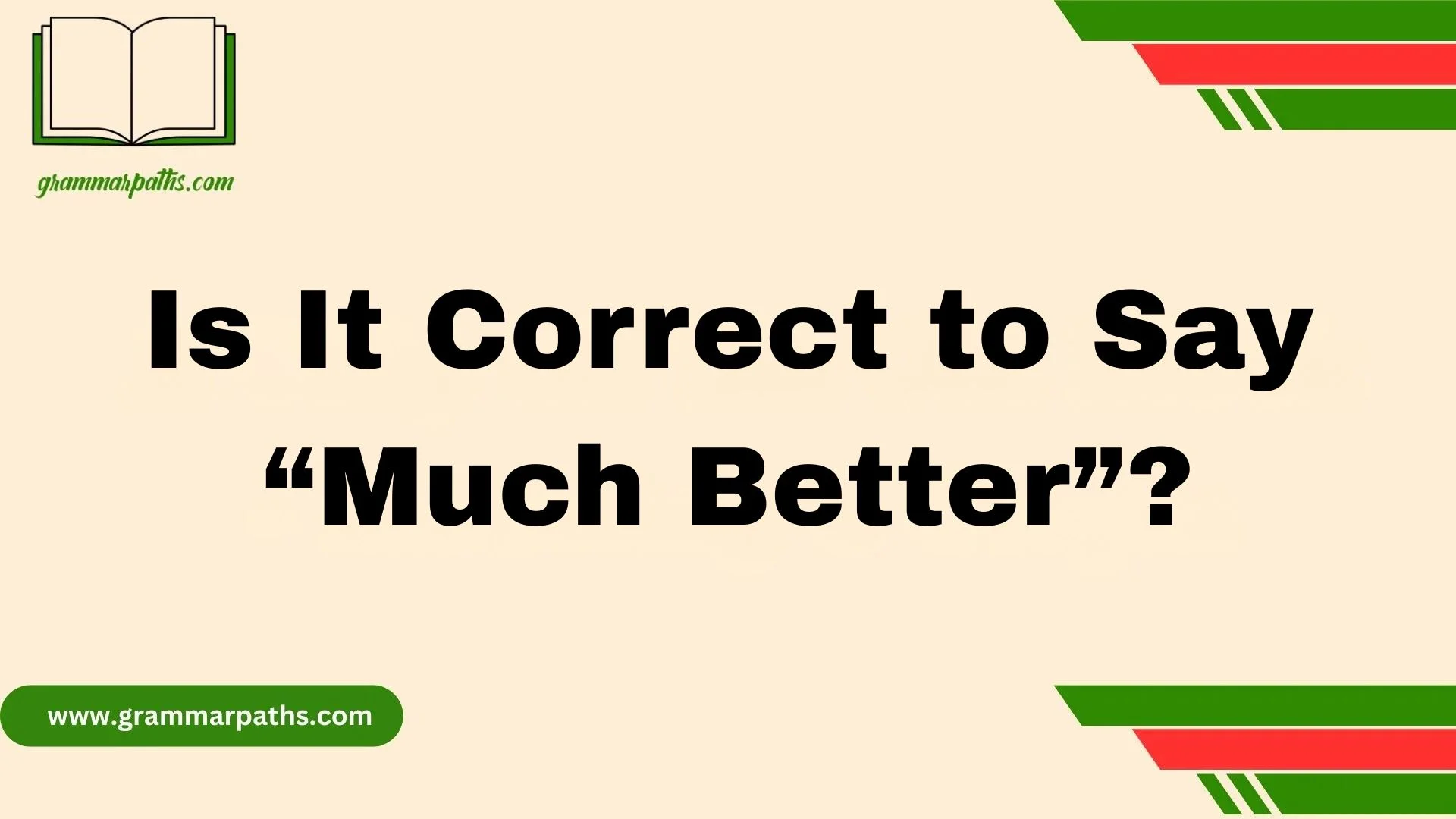In everyday speech, the phrase Is It Correct to Say “Much Better”? often feels natural—its positive tone and perception easily accepted, yet subtle differences in meaning and intention can be misunderstood. While it sounds like a big improvement, it might reflect something small, like a feeling, emotion, or minor recovery in health. From personal experience, people use “much better” in feedback, whether on a product, experience, or even to describe the quality of their day. It’s a correct phrase that’s compared across contexts — from being said formally to used casually. But it all depends on context. You must be careful, really listen to the intention behind what’s being said to grasp the deeper meaning hiding beneath the surface of the communication.
We can only explore its usage fully when we focus on clarity — how the message makes a difference when “much better” is used wisely. It’s a valid phrase in English, working across grammar structures and common expressions. You’ll often hear it in conversations, advertising, or marketing because it has a natural fit. Still, knowing the rules and embracing the flexibility of the language helps. The right situation isn’t always obvious, but the phrase usually fits well if the structure allows it and the speaker means to highlight a significant shift.
What Does “Much Better” Actually Mean?
“Much better” is a comparative phrase used to express that something or someone is significantly improved in quality, condition, performance, or feeling compared to something else.
It’s made of two parts:
- “Better” – the comparative form of “good”
- “Much” – an intensifier that makes the comparison stronger
Real-Life Examples:
- “The second draft of your essay is much better than the first.”
- “I feel much better today, thanks!”
- “This pizza is much better than what we had last week.”
In all these examples, “much” emphasizes the improvement.
The Grammar Behind “Much Better”
Let’s break it down further to understand why “much better” is grammatically correct.
Comparative Adjectives:
In English, adjectives have three degrees:
- Positive: good
- Comparative: better
- Superlative: best
“Better” already implies a comparison. You don’t need to use “more” in front of it — that would be redundant.
The Role of Intensifiers:
Words like much, far, way, a lot, and so are intensifiers. They amplify comparative adjectives:
| Base Adjective | Comparative | With Intensifier |
| good | better | much better |
| cold | colder | way colder |
| fast | faster | far faster |
So, grammatically:
- Much better = correct
- More better = incorrect
“Much Better” vs. “More Better”: What’s the Difference?
You may have heard someone say “more better”, especially in informal speech or among ESL learners. But here’s the truth:
“More Better” is Grammatically Incorrect
Why? Because “better” is already a comparative form. Adding “more” in front of it creates a double comparison, which is incorrect in standard English.
Think of it like this:
- You wouldn’t say “more taller” (you’d say “taller”)
- You wouldn’t say “more faster” (you’d say “faster”)
- So don’t say “more better” — just say “better” or “much better”
Tip: Irregular comparatives like better, worse, farther don’t take “more.”
Why Do People Say “More Better”?
- Influence of casual speech
- Emphasis or exaggeration
- Non-native habits or translation errors
But in academic, professional, or standard English, it’s wrong.
When to Use “Much Better” and When Not To
Appropriate Usage Contexts:
- Comparing two situations: “This year is much better than last year.”
- Describing health or well-being: “You’re looking much better today!”
- Reviewing performance: “Your score is much better than before.”
Don’t Use in These Situations:
- When no comparison is implied (“It’s better.” is sufficient sometimes)
- In redundancy: “More much better” (that’s just wrong)
- In overly formal writing, where a more precise term may be better (like “substantially improved”)
Formal vs. Informal Usage
“Much better” is versatile. You can use it in spoken and written English across various settings.
When It’s Perfectly Fine:
- Talking with friends: “I feel much better after sleeping.”
- Classroom feedback: “Your pronunciation is much better this week.”
- Job interview: “I’ve become much better at managing deadlines.”
When You Might Want Alternatives:
- In research papers or business presentations
- When you need a more professional tone
Alternatives to Use:
| Tone | Alternative Phrase |
| Formal | significantly improved |
| Academic | notably enhanced |
| Business | measurably more effective |
| Informal | way better, heaps better (slang) |
The Role of Tone and Intent
The way you say “much better” depends on your tone and what you want to express.
Examples Based on Tone:
| Context | Example |
| Casual | “This playlist is much better than the old one!” |
| Encouraging | “You’re getting much better at presenting!” |
| Professional | “The updated workflow is significantly more efficient.” |
In writing, audience awareness is everything. If you’re texting a friend, “much better” works just fine. If you’re writing a business report, consider leveling up your word choice.
Synonyms and Smarter Alternatives to “Much Better”
Want to enrich your vocabulary? There are many ways to say “much better” that may be more appropriate depending on tone, formality, or creativity.
Smart Alternatives:
| Context | Synonym |
| Informal | way better, far better, loads better |
| Formal | significantly improved, vastly superior |
| Creative | a cut above, head and shoulders above |
Example Sentences:
- “Her presentation was a cut above the rest.”
- “The latest version is markedly better.”
- “Customer satisfaction is noticeably improved.”
Use these phrases to avoid repetition and boost your communication.
How Students and Teachers Use “Much Better”
In the classroom setting, “much better” is a powerful tool for giving or receiving feedback.
Teacher Feedback Examples:
- “Your grammar has gotten much better this semester.”
- “This essay shows much better organization than the last.”
Student Usage Examples:
- “I feel much better about my chances on the test.”
- “My confidence is much better now after practicing.”
In educational contexts, it’s all about progress and comparison, and “much better” communicates both quickly and clearly.
“Much Better” in Professional Communication
Is “much better” professional enough for the workplace? It depends on the tone of your communication.
Use “Much Better” When:
- Giving casual praise: “Your pitch was much better this time.”
- Comparing data in informal team discussions: “These numbers look much better now.”
Use Stronger Alternatives When:
- Writing business reports
- Submitting project summaries
- Communicating with clients or executives
Alternative Phrases for Workplace:
- Substantially improved
- More efficient
- Optimized
- Drastically enhanced
Example:
Instead of “Q2 was much better than Q1”, say:
“Q2 performance showed a 23% increase in revenue, indicating substantial improvement over Q1.”
The Psychology of Comparison in Language
Humans are wired to notice differences. We rarely say something is “good” without referencing something else.
Even when we say:
- “I feel much better now.”
We’re implying: “compared to before.”
This mental shortcut is why comparatives like “much better” are so effective — they provide context, improvement, and impact in just two words.
Real-Life Examples & Usage Breakdown
Correct Usage:
- “Her speech was much better today.”
- “This method is much better than the old one.”
Incorrect Usage:
- “Her speech was more better.”
- “This is more much better.”
Case Study: Classroom Example
A teacher observed a student struggling with English pronunciation in September. By December, the student’s speaking skills had improved significantly.
Before: “Sink you very mush.”
After: “Thank you very much.”
Feedback from the teacher: “You’re speaking much better now — keep it up!”
This real-life situation shows how simple comparative praise can motivate learners.
How ESL Learners Struggle with “Much Better”
Common Mistakes:
- Saying “more better” because it sounds like intensifying
- Confusing “much” with “more”
- Literal translations from native languages
ESL Tip:
Never combine “more” with words that are already comparative, like:
- Better
- Worse
- Farther
Use “much better” instead. It’s grammatically correct and widely accepted.
Visual Grammar Guide
Cheat Table:
| Phrase | Correct? | Reason |
| much better | ✅ | Intensifier + comparative |
| more better | ❌ | Redundant |
| better | ✅ | Comparative of “good” |
| more good | ❌ | Incorrect formation |
Quick Review: Do’s and Don’ts
Do:
- Use “much better” to emphasize improvement
- Replace it with stronger alternatives when needed
- Adjust based on audience and tone
Don’t:
- Say “more better”
- Use “much better” when no comparison exists
- Forget to consider formality and context
FAQs:
Is it grammatically correct to say “much better”?
Yes, “much better” is grammatically correct. It follows standard English grammar rules and fits naturally into various sentence structures.
When should I use “much better” in a sentence?
Use it to describe a significant improvement, whether in health, product quality, or a personal experience. It fits both formal and casual settings.
Can “much better” be misunderstood?
Sometimes. Its tone, context, and intention matter. What seems like a positive change may be subtle, so always listen carefully.
Is “much better” appropriate in marketing or business?
Absolutely. It’s commonly used in marketing, advertising, and client-facing messages to show improvement and value in products or services.
Does “much better” always imply a large difference?
Not always. It can express both small and big changes depending on the context and what’s being compared.
Final Thoughts: Is It Correct to Say “Much Better”?
Saying “much better” is more than just a casual choice—it’s a reflection of how English, with its flexibility, adapts to both formal and casual communication. Whether you’re referring to a product, health, or emotion, this common expression communicates improvement with clarity and ease. It fits naturally in a variety of contexts, and when used with intention, it becomes a valid, grammatical, and powerful phrase. Understanding its usage, structure, and tone allows you to make the message more accurate and effective in both spoken and written forms.
Resources & References
- Merriam-Webster Dictionary – “Better”
- Grammarly – Comparative and Superlative Adjectives
- Cambridge English Grammar Guide
- Purdue OWL – Grammar and Mechanics

Mia Rose is the passionate writer and founder of GrammarPaths.com, a resource dedicated to helping learners master English grammar, idioms, and writing skills with ease. With a deep love for language and years of experience in teaching and content creation, Mia simplifies complex grammar rules into clear, practical guides that readers can instantly apply.












